26-YO Nagaland Man Uses Trash & Bamboo To Build Low-Cost Solar Dryer For Farmers, Wins IARI Award
“Our hard work was going to waste.”
Every year after the harvest, farmer Verazo Rhakho from Thuvopisu village in Nagaland would watch crates of leftover kiwi, tomatoes, and plums spoil.
“We had no electricity to run dryers or refrigerators. Watching all that produce rot was heartbreaking,” he shares. For Verazo and many like him, the emotional toll was only part of the loss. The financial damage from spoiled produce cut deep.
In nearby Dzulhami village, 74-year-old Nepruzu Keyho recalls his own struggle. “We used to dry turmeric, chillies, and medicinal plants under the sun. But rain or insects would ruin everything. It was a long, tiring process that often ended in disappointment.” Their stories reflect a larger reality — traditional methods of drying and storing harvests are failing, especially in villages without steady electricity.
In many parts of Nagaland’s hilly terrain, poor infrastructure leaves farmers with few options. Crops are grown with care, only to decay before they can be sold. But in the village of Porba, a gentle shift is underway. One young man is helping change the story.
At just 26, Swuyievezo Dzudo has built a low-cost solar dryer — a simple, electricity-free device that’s helping farmers preserve their produce, reduce waste, and earn better incomes. His idea is offering a path forward that relies not on power grids or big machinery, but on sunlight, local materials, and listening to the needs of his community.
From botany to the barnyard: A scholar returns home
When Swuyievezo Dzudo came back to his village of Porba after finishing his postgraduation studies from St Joseph University, Dimapur, he wasn’t looking for a job in the city — he was looking for ways to help farmers like the ones he grew up around.
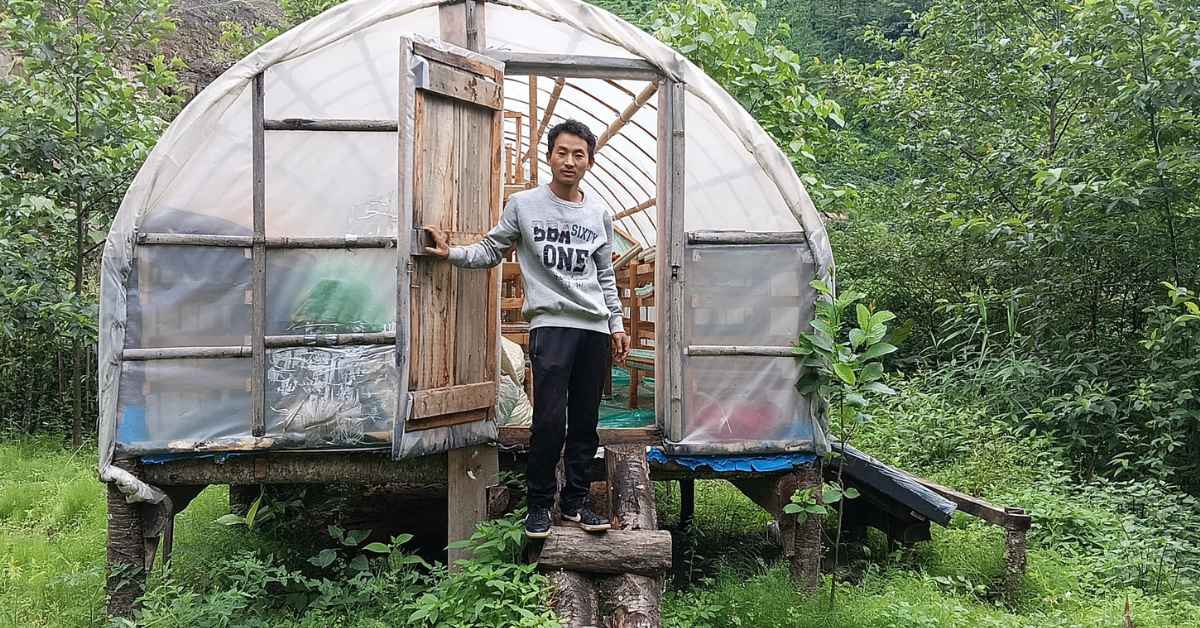 Swuyievezo Dzudo has built a low-cost solar dryer, an electricity-free device that’s helping farmers preserve their produce
Swuyievezo Dzudo has built a low-cost solar dryer, an electricity-free device that’s helping farmers preserve their produce
Back in Porba, he began spending time with farmers, listening to their daily struggles. And somewhere in those conversations, he asked what they did with the leftover harvest. “Most told me they had no reliable electricity, making it almost impossible to preserve their surplus crops properly. This led to huge losses, as the excess would simply rot or be turned into compost.”
With infrastructure lagging far behind, many hilly parts of Nagaland still face severe power shortages — and when electricity is available, it’s often too erratic to rely on. As Swuyievezo listened to the farmers, this recurring challenge kept surfacing. Over time, it became clear to him that any real solution would need to work without relying on power at all.
That’s when he began exploring the idea of building a solar dryer — something simple, affordable, and effective that could help preserve fresh produce without electricity.
He started collaborating with Kirat Biotech Private Limited in Guwahati and took guidance from ICAR’s Krishi Vigyan Kendra (KVK) in Phek. “These partnerships allowed me to understand the exact problems farmers face and helped shape the design of the dryer,” he tells The Better India.
Beer cans, bamboo & a bit of sunlight changed the game
At its simplest, solar drying is just using sunlight to remove moisture from crops — a way to keep fruits, vegetables, and medicinal plants from going bad. Farmers have done it for generations, but the traditional method has its limits. Left out in the open, the produce gets hit by dust, insects, sudden rain, and harsh sunlight that can spoil both taste and quality. Industrial dryers solve these problems but come with high costs and require a steady electricity supply — something most rural farmers don’t have.
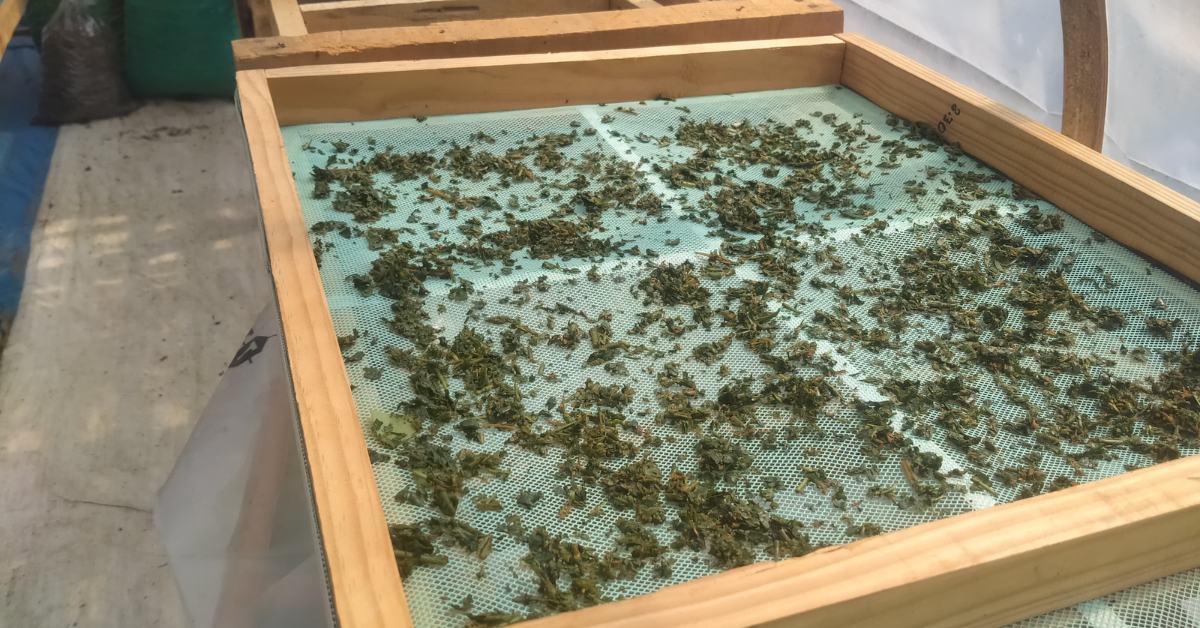 The low-cost solar dryer helps to preserve the excess produce of all kinds of crops without affecting the quality
The low-cost solar dryer helps to preserve the excess produce of all kinds of crops without affecting the quality
That’s where Swuyievezo’s low-cost solar dryer bridges the gap. Built using locally available and recycled materials, the dryer is designed to be affordable, durable, and effective — a true game changer for rural farming communities.
“We used bamboo and wood for the main structure because these are abundant in our village and inexpensive,” he explains to The Better India. Bamboo, in particular, is lightweight, strong, and sustainable, making it ideal for rural construction. To absorb heat efficiently, the dryer incorporates an ingenious solar accumulator made from empty aluminium beer cans. These cans store the sun’s heat, creating a consistent warming effect inside the drying chamber.
To retain heat and protect the produce from harsh direct sunlight, Swuyievezo initially used acrylic sheets, but later switched to glass sheets, which are more durable and better for insulation. The drying chamber is lined with UV-protective sheets that filter out harmful rays, shielding the produce from damage and keeping insects and pests at bay.
An exhaust fan, powered by a small solar panel, ensures continuous airflow and removes excess moisture — creating an optimal drying environment.
“One of the biggest challenges was balancing heat retention with proper airflow,” the innovator notes. “Too much humidity would cause mould, but too little airflow would slow the drying process. We experimented with fan placement, materials, and layouts until we found the right balance.”
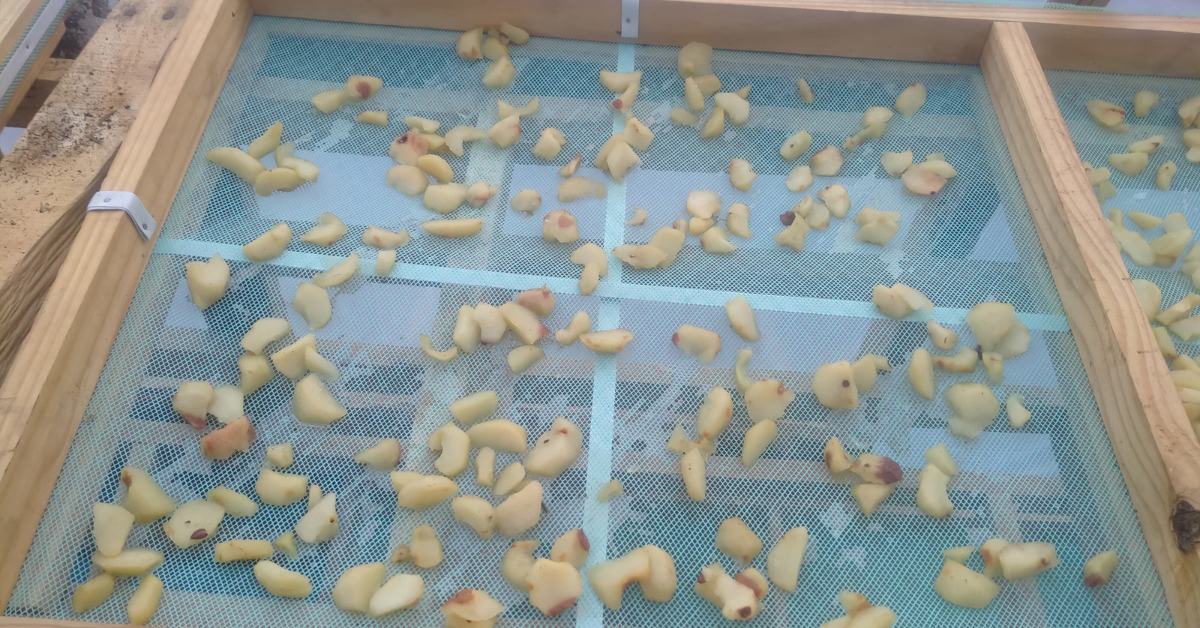 The structure of the solar dryer is made using bamboo and wood to keep the cost low for all farmers
The structure of the solar dryer is made using bamboo and wood to keep the cost low for all farmers
The fan itself is repurposed from discarded computer or laptop parts — another small but significant touch that keeps costs low and makes the system more sustainable.
A solution that fits a farmer’s budget
Cost is a critical factor for rural farmers, many of whom survive on modest incomes. Industrial dryers often cost lakhs — far beyond what smallholder farmers can afford. Swuyievezo’s solar dryer offers a much-needed alternative: affordable, customisable, and built from materials that don’t strain the farmer’s pocket.
A five-foot model costs approximately Rs 7,000, while larger units measuring 10 by 10 feet range between Rs 25,000 and Rs 30,000. The lower cost is possible because of the use of readily available materials such as bamboo, wood, aluminium cans, UV sheets, and solar panels — all chosen to reduce expenses without compromising function.
“Though the cost is low, so far we have been providing the solar dryers free of charge to farmers in five villages of Nagaland,” he says. “We want to make sure that every farmer, regardless of income, can access this technology and improve their livelihoods.” The five beneficiary villages — Porba, Thuvopisu, Dzulhami, Runguzu, and Ciepoketa — have seen about 500 farmers receive these dryers.
The impact on local farmers has been powerful and immediate. Verazo, who constructed two solar dryers on his farm with Swuyievezo’s guidance, explains to The Better India, “The quality of dried kiwi and other fruits is excellent. The dryer preserves the flavour and colour, and the shelf life is extended. We can now sell dried fruits months after harvest, which opens up new market opportunities and better income.”
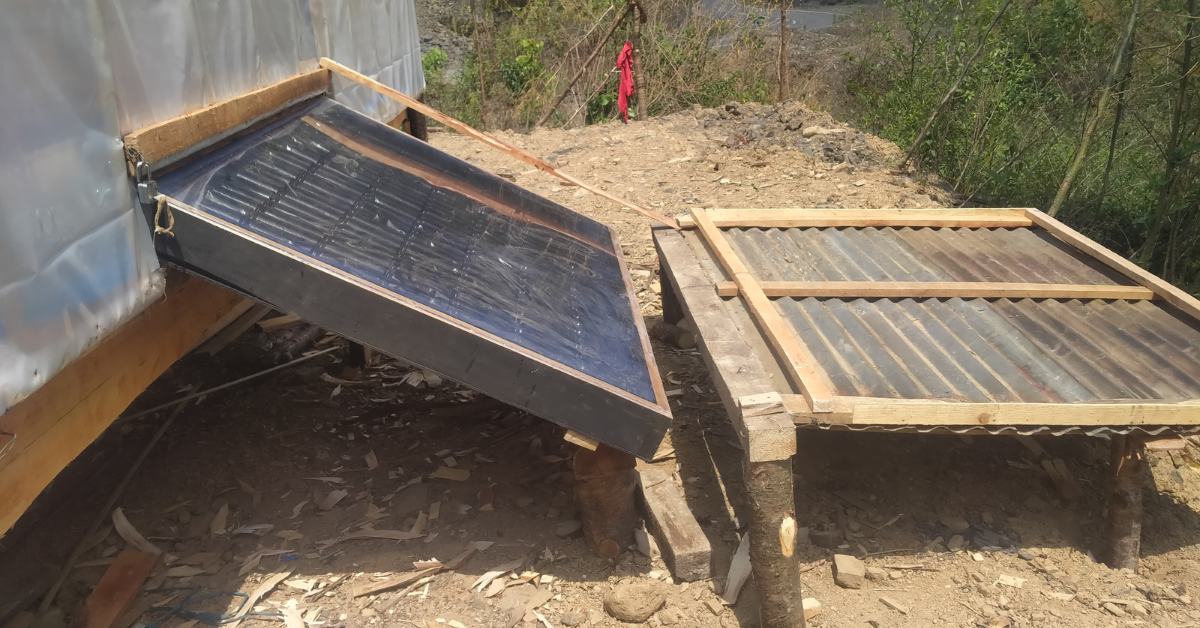 To absorb heat efficiently, the dryer incorporates an ingenious solar accumulator made from empty aluminium beer cans
To absorb heat efficiently, the dryer incorporates an ingenious solar accumulator made from empty aluminium beer cans
Nepruzu agrees. “This dryer has been a blessing. It dries my turmeric, chillies, and medicinal plants faster and more efficiently than sun drying. It reduces labour and crop wastage, and we get better prices at the market because the quality is so much higher.”
Seeing these changes firsthand, Swuyievezo says the shift has been significant. Before the solar dryer, farmers were often forced to sell their produce quickly at low prices, fearing it would spoil. “Now, they can dry fruits, vegetables, spices, and herbs safely — which reduces waste and adds value. It is helpful for the whole community.”
The real test: Making it work in Nagaland’s climate
Developing the solar dryer brought its share of challenges. Nagaland’s cold climate and high humidity initially made Swuyievezo question whether the dryer would work efficiently in the region.
“I was not sure if the solar dryer would work well here because it is quite cold, especially in the winter,” he recalls. “That is why I chose bamboo and wood for insulation, combined with aluminium cans and glass sheets to maximise heat retention. I also discussed this with Manish Choudhury, the Chief Technology Officer at Kirat Biotech, who helped me come up with the perfect design and refine my idea further.”
Getting farmers to adopt the new technology wasn’t easy either. “Many were hesitant at first because they lacked technical knowledge,” he explains. “But with demonstrations and training, we showed them how easy it is to use. Once they saw the results, their confidence grew, and many farmers started using the solar dryer.”
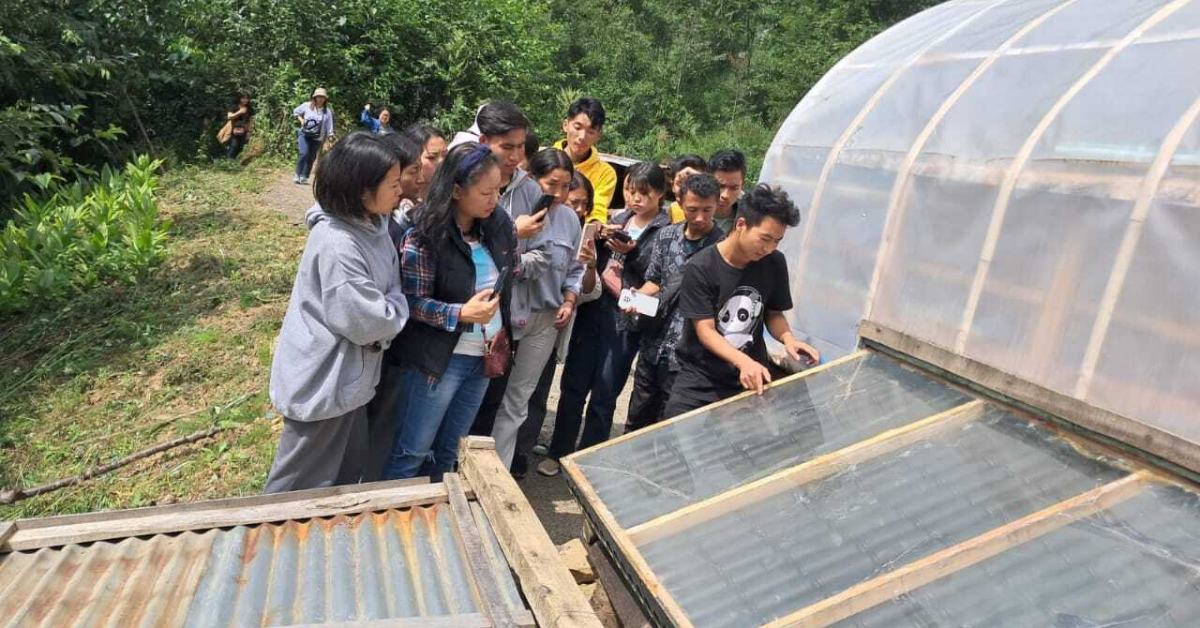 The solar dryer is an eco-friendly solution that runs entirely on solar energy and uses recycled materials
The solar dryer is an eco-friendly solution that runs entirely on solar energy and uses recycled materials
He credits Kirat Biotech not just for technical support, but also for actively helping local farmers. The company provided essential materials like UV sheets, which are otherwise hard to find in the region.
The solar dryer is an eco-friendly solution that runs entirely on solar energy and uses recycled materials. It removes the need for chemical preservatives, ensuring that the dried produce remains safe for consumption and supports sustainable farming practices. For Swuyievezo, it’s part of a larger goal — to create affordable, locally sourced solutions that address the day-to-day challenges of farmers in rural areas.
In fact, he has also built a low-cost polyhouse to protect seedlings and improve crop yields. “I want to continue innovating and scaling solutions that empower farmers while protecting our environment,” he shares with The Better India.
‘Our priority is impact, not profit’
Swuyievezo’s work was recognised with the prestigious IARI Innovative Farmer Award 2025, presented at the Pusa Agri Fair in New Delhi. “Winning this award was a great encouragement,” he reflects. “It shows that youth from rural areas can contribute to agricultural development with the right support and vision.”
While he hopes to scale the solar dryer commercially in the future, for now, the focus remains on outreach and education. “We have not charged the farmers yet because our priority is impact over profit,” he notes. “In the future, we want to find ways to make it sustainable as a business so more villages can benefit.”
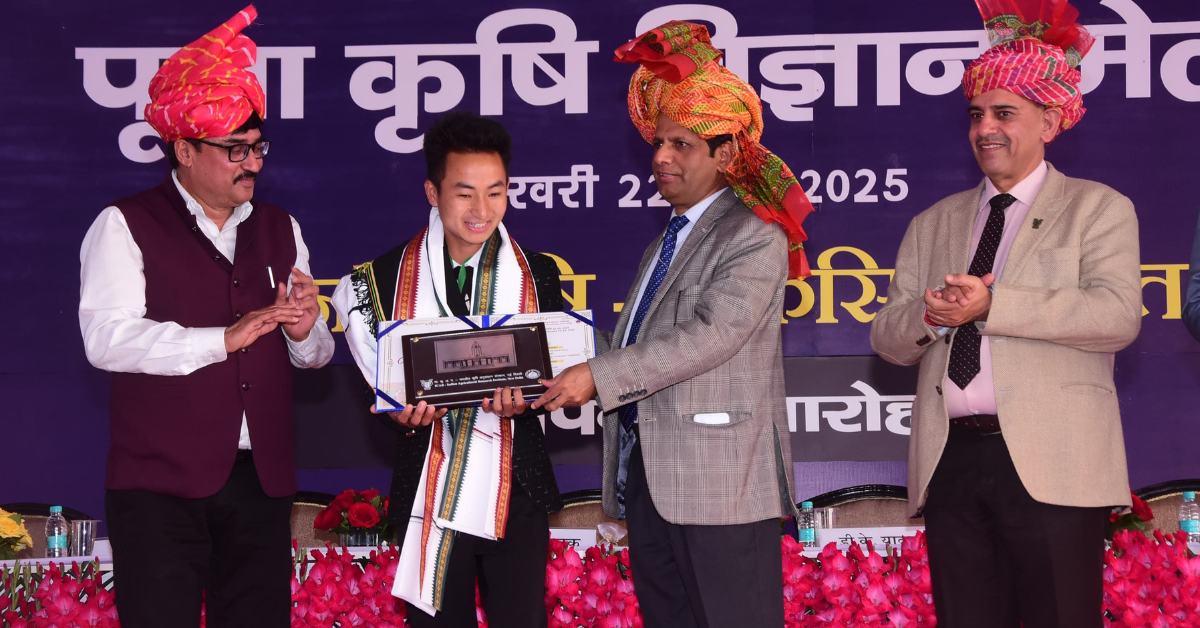 Swuyievezo received the prestigious IARI Innovative Farmer Award 2025, presented at the Pusa Agri Fair in New Delhi
Swuyievezo received the prestigious IARI Innovative Farmer Award 2025, presented at the Pusa Agri Fair in New Delhi
As more farmers begin to use the solar dryer, the shift is already visible across the region — less waste, longer shelf life, and better incomes.
Farmer Verazo breathes a sigh of relief. “We no longer see our excess produce go to waste. Now, we can make something more out of it by turning it into value-added products. This innovation has given us a practical way forward.”
Nepruzu adds, “For us, the solar dryer is a technology that has changed how we work with our land and our produce.”
Swuyievezo’s journey — from a curious student to an award-winning innovator — shows that real change doesn’t always need big machines or big money. Sometimes, it begins with listening, experimenting, and building with what’s already around you. By helping farmers turn waste into something valuable, he’s made a clear and lasting difference — one that puts practical tools, dignity, and better incomes back in the hands of the people who grow our food.
All pictures courtesy Swuyievezo Dzudo
News